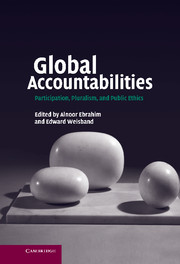Book contents
- Frontmatter
- Contents
- List of tables
- List of figures
- Acknowledgments
- List of contributors
- 1 Introduction: forging global accountabilities
- Part I Public accountability: participatory spheres from global to local
- Part II Experiments in forging NGO accountability: mutuality and context
- Part III Reflective accountability: new directions for participatory practices
- Part IV Global accountability frameworks and corporate social responsibility
- Index
Part III - Reflective accountability: new directions for participatory practices
Published online by Cambridge University Press: 22 September 2009
- Frontmatter
- Contents
- List of tables
- List of figures
- Acknowledgments
- List of contributors
- 1 Introduction: forging global accountabilities
- Part I Public accountability: participatory spheres from global to local
- Part II Experiments in forging NGO accountability: mutuality and context
- Part III Reflective accountability: new directions for participatory practices
- Part IV Global accountability frameworks and corporate social responsibility
- Index
Summary
We now turn to operational innovations for meeting the challenges identified in Part II– for reconciling the technocratic and managerial demands of accountability with the social impulses drawn from organizational mission, values, and context. Lisa Jordan leads this section by proposing a “rights-based framework” within which to build NGO accountability. She challenges NGOs and donors which promote democratic rights to practice what they preach. Drawing from the path-breaking experiences of ActionAid and the Humanitarian Accountability Project, she offers an approach to accountability that not only recognizes the importance of context, but also provides a powerful way of linking accountability to mission and values. This is accountability as strategic choice, rather than accountability as coercion or mimicry.
Coralie Bryant similarly pursues how accountability might be used to strategic advantage by several of the world's largest transnational NGOs engaged in international emergency relief work. She is especially concerned about increasing calls from donors for accountability centered on measurable “results” and cautions that this “can mean either pushing for quick fixes or insisting upon digging up the seedling to examine its roots before it can bear fruit.” She thus challenges NGO leaders to refocus on long-term effectiveness achievable through better evaluation practices. A surprising insight from her cases is that those NGOs least dependent on donor funding are actually the most effective in terms of evaluation and learning.
- Type
- Chapter
- Information
- Global AccountabilitiesParticipation, Pluralism, and Public Ethics, pp. 149 - 150Publisher: Cambridge University PressPrint publication year: 2007

